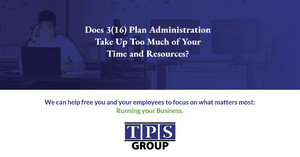Posted on Aug 7, 2020
Offering an attractive 401(k) plan is important to attract and retain good employees, but just as important is effective administration of the plan. Hiring a 3(16) fiduciary relieves you of the burden of managing the many day-to-day administrative tasks associated with the 401(k) plan, reduces your liability and the risk of an audit, and enables your HR staff to focus on their own responsibilities.
It’s important to make an informed decision about plan management and understand your employer responsibilities, such as timeliness of deposits and providing accurate employee census information to the 3(16) fiduciary. The 3(16) fiduciary’s duties may include:
- Plan participant services such as determining employee eligibility and maintaining records
- Distributing statements, annual notices, and other documents as required to employees and other participants
- Government reporting services such as signing and filing annual 5500 forms and other reports
- Approving and processing loans and distributions
- Correcting plan errors that can lead to compliance test, nondiscrimination test, and ADP/ACP test failure
Many service providers who advertise themselves as 3(16) fiduciaries provide only some of the required functions. You as the employer should thoroughly review the services offered, the contract language, disclaimers, and limits of liability. Important areas to evaluate include the following:
- Is the 3(16) fiduciary qualified and experienced?
- Are the fees reasonable?
- What are the services offered? Ask for the specifics of plan document services, participant management and distribution services, and government reporting.
Failure to abide by the complex ERISA regulations governing 401(k) plans can have serious consequences. With the right, professional fiduciary support, you can be assured that your plan is in compliance.
This material is provided for informational purposes only, and is not intended as authoritative guidance, legal advice, or assurance of compliance with state and federal regulations.

